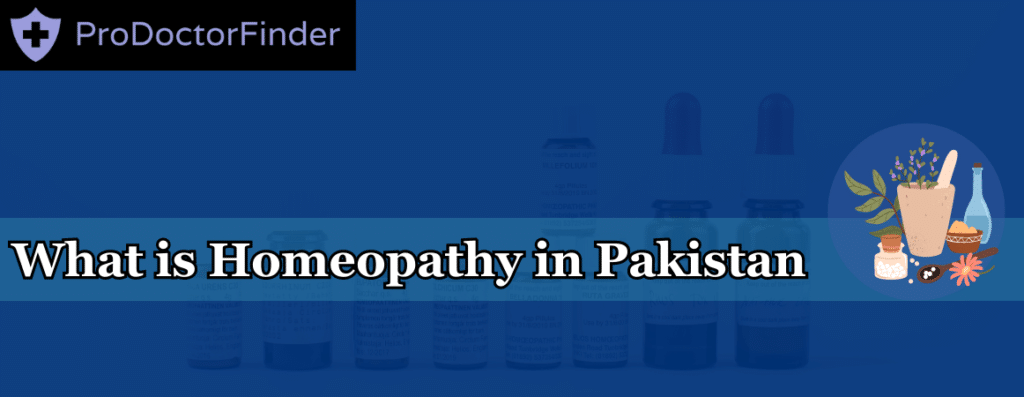
Homeopathy is an alternative medicine system that uses natural substances to stimulate the body’s own healing processes. It was founded by German physician Samuel Hahnemann in the late 18th century and has since gained popularity worldwide. Homeopathy operates on the principle of “like cures like,” meaning that a substance that can cause symptoms in a healthy person can also cure those same symptoms in a sick person when given in a highly diluted form. In this article, we will explore what is homeopathy in Pakistan, how it is practiced, and the regulations and governing bodies that oversee it.
What are the Doctors of Homeopathy called?
Doctors of homeopathy in Pakistan are referred to as homeopathic doctors or practitioners. To become a registered homeopathic doctor or practitioner in Pakistan, one must have a four-year diploma in health and homeopathic medicine from a recognized institution. In addition to their education in health, homeopathic doctors or practitioners must pass an exam administered by the Pakistan National Council for Homoeopathy.
Homeopathy in Pakistan
Homeopathy was introduced in Pakistan during British colonial rule, and it has been a part of the healthcare system ever since. It is estimated that there are around 25,000 homeopathic practitioners in Pakistan, with a large number of patients seeking treatment from them. Homeopathic medicine is commonly used to treat chronic conditions such as arthritis, asthma, and allergies, as well as acute illnesses like colds and flu.
National Council for Homoeopathy
The National Council for Homoeopathy (NCH) is the regulatory body that oversees the practice of the homoeopathic system of medicine in Pakistan. It is a federal government organization that was established in 1965 under the Homoeopathic System of Medicine (Working) in Pakistan. The national council, is responsible for registering homoeopathic practitioners, setting standards for education and training, and ensuring that the practice of homoeopathy in Pakistan is in line with international standards.
Welcome to National Council for Homoeopathy
The NCH office is located in Islamabad and is responsible for regulating the practice of homoeopathic medicine in Pakistan. The council is headed by a president and consists of eleven members, including one deputy secretary from the Ministry of Health. The council has four members from the homoeopathic profession, two members from the allopathic profession, and two members from the Unani Ayurvedic profession.
National Council for Homoeopathy and Homoeopathic Practitioners Act
The Homoeopathic Practitioners Act was passed in 1973, and it outlines the qualifications and regulations for the practice of homeopathy in Pakistan. The act requires all homoeopathic practitioners to be registered with the NCH and to renew their registration annually. It also sets standards for the practice of homeopathy and the use of homeopathic medicines.
The Role of the National Council for Homoeopathy
The NCH is responsible for regulating the practice of homeopathy in Pakistan. It is responsible for registering homeopathic practitioners, ensuring that they meet the required qualifications and standards of practice. The NCH is also regulates the manufacture and sale of homeopathic medicines, ensuring that they are safe and effective for patients.
The use of natural substances in homeopathy Homeopathy uses natural substances such as plants, minerals, and animal products to treat patients. These substances are highly diluted to the point where they are no longer toxic but still retain their healing properties. Homeopathy believes that these substances stimulate the patient and body’s natural healing mechanisms and promote overall wellness and health.
The Recognition of Homeopathy in Pakistan
Homeopathy is recognized as a valid form of healthcare in Pakistan, and it is regulated by the NCH. The NCH ensures that homeopathic practitioners meet the required standards of practice and that the medicines used in homeopathy are safe and effective. The federal government and provincial government, of Pakistan also recognizes homeopathy and have included it in the national healthcare system.
The relationship between homeopathy and other alternative medicine systems Pakistan has a rich tradition of alternative medicine, and homeopathy is just one of many systems of medicine practiced in the country. Other medicine systems such as Unani and Ayurvedic medicine are also popular in Pakistan. While these systems have their unique principles and practices, they share a common goal of promoting wellness and treating patients with natural substances.
Conclusion
In conclusion, homoeopathy is a popular medicine system that is widely practiced in Pakistan. The practice is regulated by the National Council for Homoeopathy, which sets standards for education and training and oversees the registration and licensing of practitioners. Homeopathic practitioners in Pakistan must have a four-year diploma in homoeopathic medicine from a recognized institution and must pass an exam administered by the NCH. With over 200,000 registered practitioners, homoeopathy continues to be an important form of healthcare for many patients in Pakistan.
FAQs
Is homeopathy legal in Pakistan?
Pakistan officially recognized homoeopathy in 1965 and under the Unani Ayurveda and Holoeopathic Practitioners Act, the first homeopathic name boards were established. Sept. 7, 2011.
What is the homeopathic course in Pakistan?
BHMS Homoeopathic Medicine at a total of 32 Universities. Islamia University of Bahawalpur. Islamia University of Bahawalpur. … Jinnah universiteit de la femme. … Homeopathy Institute of Pakistan. … Homeopathic medicine school. . Sérin Homeopathy Medicine College. . Vertex College of Sciences & Technologies.
What is homeopathy and how does it work?
Homeopathy or the homeopathic system of medicine is a medical alternative based upon the principle that treatment is like. Homeopathy claims that it induces healing reactions in people by delivering drugs mimicking symptoms. Homeopathic medicines are sometimes contested in medicine.
What is the purpose of homeopathy?
It can be used to treat a broad spectrum of health problems ranging from asthma to psychological health problems like depression.